Papers
2022
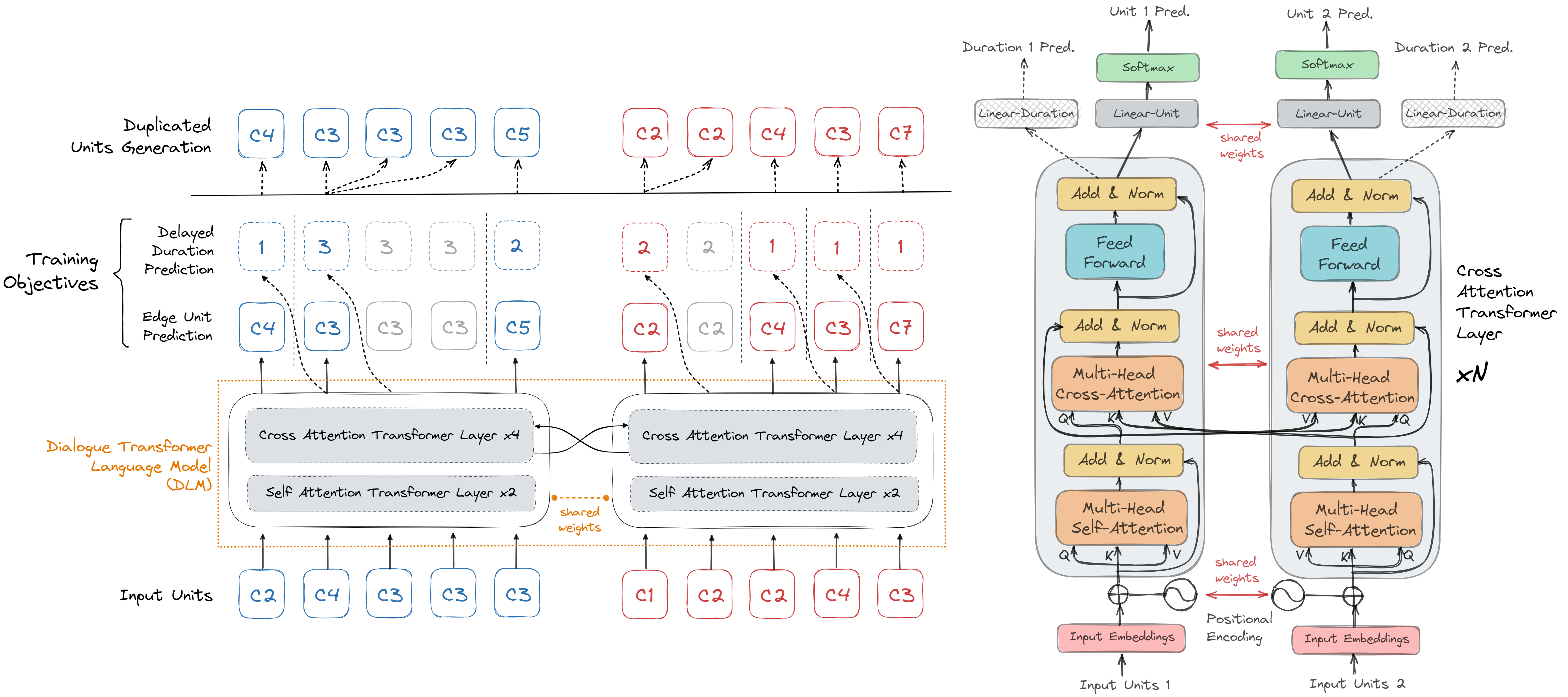
Generative Spoken Dialogue Language Modeling
Tu Anh Nguyen, Eugene Kharitonov, Jade Copet, Yossi Adi, Wei-Ning Hsu, Ali Elkahky, Paden Tomasello, Robin Algayres, Benoit Sagot, Abdelrahman Mohamed, Emmanuel Dupoux
Abstract We introduce dGSLM, the first "textless" model able to generate audio samples of naturalistic spoken dialogues. It uses recent work on unsupervised spoken unit discovery coupled with a dual-tower transformer architecture with cross-attention trained on 2000 hours of two-channel raw conversational audio (Fisher dataset) without any text or labels. It is able to generate speech, laughter and other paralinguistic signals in the two channels simultaneously and reproduces naturalistic turn taking. Blog Demo
Tu Anh Nguyen, Eugene Kharitonov, Jade Copet, Yossi Adi, Wei-Ning Hsu, Ali Elkahky, Paden Tomasello, Robin Algayres, Benoit Sagot, Abdelrahman Mohamed, Emmanuel Dupoux
Abstract We introduce dGSLM, the first "textless" model able to generate audio samples of naturalistic spoken dialogues. It uses recent work on unsupervised spoken unit discovery coupled with a dual-tower transformer architecture with cross-attention trained on 2000 hours of two-channel raw conversational audio (Fisher dataset) without any text or labels. It is able to generate speech, laughter and other paralinguistic signals in the two channels simultaneously and reproduces naturalistic turn taking. Blog Demo
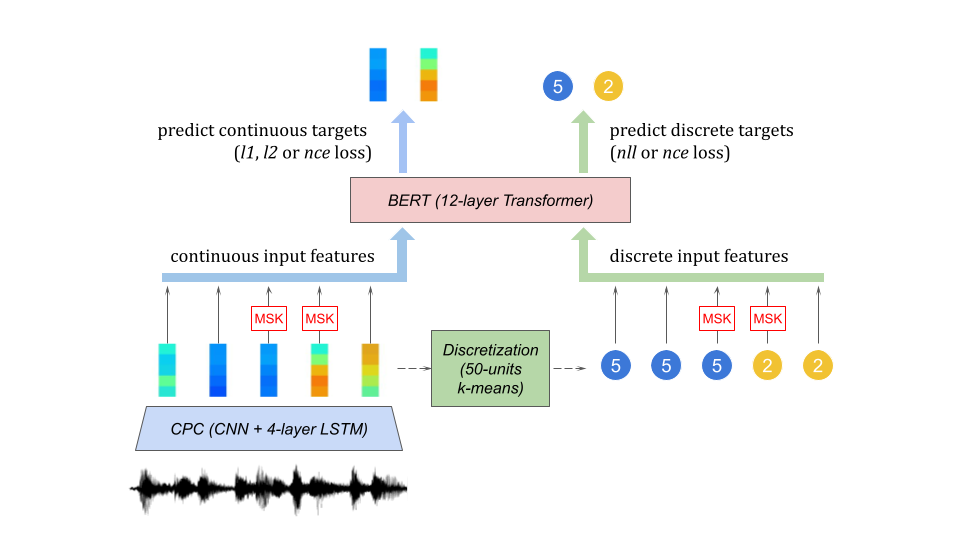
Are discrete units necessary for Spoken Language Modeling?
Tu Anh Nguyen, Benoit Sagot, Emmanuel Dupoux
Abstract Recent work in spoken language modeling shows the possibility of learning a language unsupervisedly from raw audio without any text labels. The approach relies first on transforming the audio into a sequence of discrete units (or pseudo-text) and then training a language model directly on such pseudo-text. Is such a discrete bottleneck necessary, potentially introducing irreversible errors in the encoding of the speech signal, or could we learn a language model without discrete units at all? In this work, show that discretization is indeed essential for good results in spoken language modeling, but that can omit the discrete bottleneck if we use using discrete target features from a higher level than the input features. We also show that an end-to-end model trained with discrete target like HuBERT achieves similar results as the best language model trained on pseudo-text on a set of zero-shot spoken language modeling metrics from the Zero Resource Speech Challenge 2021.
Tu Anh Nguyen, Benoit Sagot, Emmanuel Dupoux
Abstract Recent work in spoken language modeling shows the possibility of learning a language unsupervisedly from raw audio without any text labels. The approach relies first on transforming the audio into a sequence of discrete units (or pseudo-text) and then training a language model directly on such pseudo-text. Is such a discrete bottleneck necessary, potentially introducing irreversible errors in the encoding of the speech signal, or could we learn a language model without discrete units at all? In this work, show that discretization is indeed essential for good results in spoken language modeling, but that can omit the discrete bottleneck if we use using discrete target features from a higher level than the input features. We also show that an end-to-end model trained with discrete target like HuBERT achieves similar results as the best language model trained on pseudo-text on a set of zero-shot spoken language modeling metrics from the Zero Resource Speech Challenge 2021.
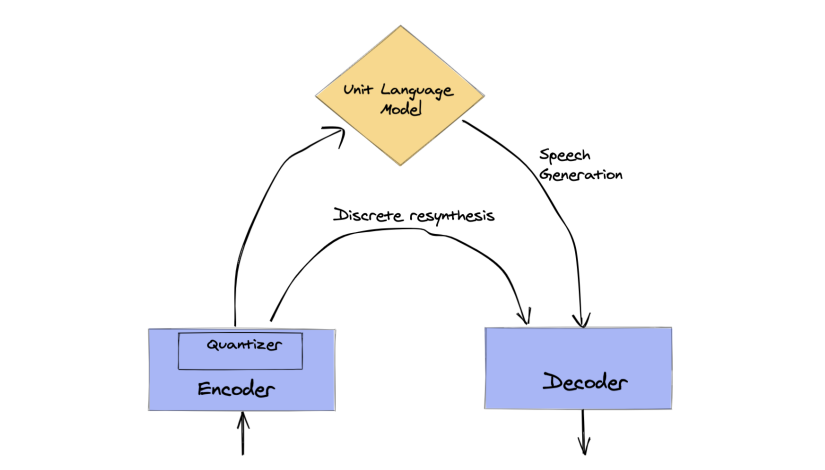
textless-lib: a Library for Textless Spoken Language Processing
Eugene Kharitonov, Jade Copet, Kushal Lakhotia, Tu Anh Nguyen, Paden Tomasello, Ann Lee, Ali Elkahky, Wei-Ning Hsu, Abdelrahman Mohamed, Emmanuel Dupoux, Yossi Adi
Abstract Textless spoken language processing research aims to extend the applicability of standard NLP toolset onto spoken language and languages with few or no textual resources. In this paper, we introduce textless-lib, a PyTorch-based library aimed to facilitate research in this research area. We describe the building blocks that the library provides and demonstrate its usability by discuss three different use-case examples: (i) speaker probing, (ii) speech resynthesis and compression, and (iii) speech continuation. We believe that textless-lib substantially simplifies research the textless setting and will be handful not only for speech researchers but also for the NLP community at large. Code Blog
Eugene Kharitonov, Jade Copet, Kushal Lakhotia, Tu Anh Nguyen, Paden Tomasello, Ann Lee, Ali Elkahky, Wei-Ning Hsu, Abdelrahman Mohamed, Emmanuel Dupoux, Yossi Adi
Abstract Textless spoken language processing research aims to extend the applicability of standard NLP toolset onto spoken language and languages with few or no textual resources. In this paper, we introduce textless-lib, a PyTorch-based library aimed to facilitate research in this research area. We describe the building blocks that the library provides and demonstrate its usability by discuss three different use-case examples: (i) speaker probing, (ii) speech resynthesis and compression, and (iii) speech continuation. We believe that textless-lib substantially simplifies research the textless setting and will be handful not only for speech researchers but also for the NLP community at large. Code Blog
2021
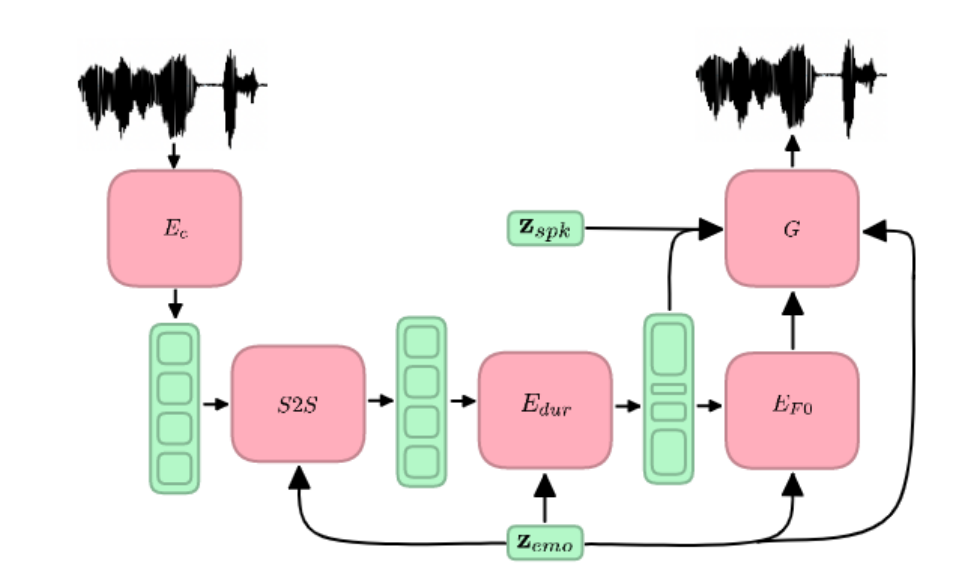
Textless speech emotion conversion using decomposed and discrete representations
Felix Kreuk, Adam Polyak, Jade Copet, Eugene Kharitonov, Tu Anh Nguyen, Morgane Revière, Wei-Ning Hsu, Abdelrahman Mohamed, Emmanuel Dupoux, Yossi Adi
Abstract Speech emotion conversion is the task of modifying the perceived emotion of a speech utterance while preserving the lexical content and speaker identity. In this study, we cast the problem of emotion conversion as a spoken language translation task. We use a decomposition of the speech signal into discrete learned representations, consisting of phonetic-content units, prosodic features, speaker, and emotion. First, we modify the speech content by translating the phonetic-content units to a target emotion, and then predict the prosodic features based on these units. Finally, the speech waveform is generated by feeding the predicted representations into a neural vocoder. Such a paradigm allows us to go beyond spectral and parametric changes of the signal, and model non-verbal vocalizations, such as laughter insertion, yawning removal, etc. We demonstrate objectively and subjectively that the proposed method is vastly superior to current approaches and even beats text-based systems in terms of perceived emotion and audio quality. We rigorously evaluate all components of such a complex system and conclude with an extensive model analysis and ablation study to better emphasize the architectural choices, strengths and weaknesses of the proposed method. Blog Demo
Felix Kreuk, Adam Polyak, Jade Copet, Eugene Kharitonov, Tu Anh Nguyen, Morgane Revière, Wei-Ning Hsu, Abdelrahman Mohamed, Emmanuel Dupoux, Yossi Adi
Abstract Speech emotion conversion is the task of modifying the perceived emotion of a speech utterance while preserving the lexical content and speaker identity. In this study, we cast the problem of emotion conversion as a spoken language translation task. We use a decomposition of the speech signal into discrete learned representations, consisting of phonetic-content units, prosodic features, speaker, and emotion. First, we modify the speech content by translating the phonetic-content units to a target emotion, and then predict the prosodic features based on these units. Finally, the speech waveform is generated by feeding the predicted representations into a neural vocoder. Such a paradigm allows us to go beyond spectral and parametric changes of the signal, and model non-verbal vocalizations, such as laughter insertion, yawning removal, etc. We demonstrate objectively and subjectively that the proposed method is vastly superior to current approaches and even beats text-based systems in terms of perceived emotion and audio quality. We rigorously evaluate all components of such a complex system and conclude with an extensive model analysis and ablation study to better emphasize the architectural choices, strengths and weaknesses of the proposed method. Blog Demo
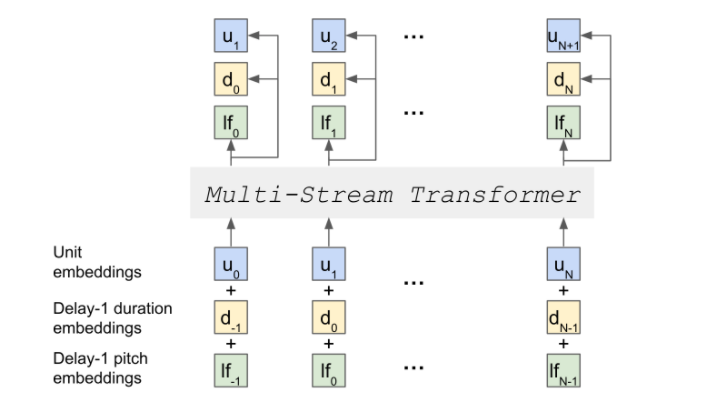
Text-Free Prosody-Aware Generative Spoken Language Modeling In Proc. of ACL 2022
Eugene Kharitonov*, Ann Lee*, Adam Polyak, Yossi Adi, Jade Copet, Kushal Lakhotia, Tu Anh Nguyen, Morgane Rivière, Abdelrahman Mohamed, Emmanuel Dupoux, Wei-Ning Hsu
Abstract Speech pre-training has primarily demonstrated efficacy on classification tasks, while its capability of generating novel speech, similar to how GPT-2 can generate coherent paragraphs, has barely been explored. Generative Spoken Language Modeling (GSLM) (Lakhotia et al., 2021) is the only prior work addressing the generative aspects of speech pre-training, which replaces text with discovered phone-like units for language modeling and shows the ability to generate meaningful novel sentences. Unfortunately, despite eliminating the need of text, the units used in GSLM discard most of the prosodic information. Hence, GSLM fails to leverage prosody for better comprehension, and does not generate expressive speech. In this work, we present a prosody-aware generative spoken language model (pGSLM). It is composed of a multi-stream transformer language model (MS-TLM) of speech, represented as discovered unit and prosodic feature streams, and an adapted HiFi-GAN model converting MS-TLM outputs to waveforms. We devise a series of metrics for prosody modeling and generation, and re-use metrics from GSLM for content modeling. Experimental results show that the pGSLM can utilize prosody to improve both prosody and content modeling, and also generate natural, meaningful, and coherent speech given a spoken prompt. Code Blog Demo
Eugene Kharitonov*, Ann Lee*, Adam Polyak, Yossi Adi, Jade Copet, Kushal Lakhotia, Tu Anh Nguyen, Morgane Rivière, Abdelrahman Mohamed, Emmanuel Dupoux, Wei-Ning Hsu
Abstract Speech pre-training has primarily demonstrated efficacy on classification tasks, while its capability of generating novel speech, similar to how GPT-2 can generate coherent paragraphs, has barely been explored. Generative Spoken Language Modeling (GSLM) (Lakhotia et al., 2021) is the only prior work addressing the generative aspects of speech pre-training, which replaces text with discovered phone-like units for language modeling and shows the ability to generate meaningful novel sentences. Unfortunately, despite eliminating the need of text, the units used in GSLM discard most of the prosodic information. Hence, GSLM fails to leverage prosody for better comprehension, and does not generate expressive speech. In this work, we present a prosody-aware generative spoken language model (pGSLM). It is composed of a multi-stream transformer language model (MS-TLM) of speech, represented as discovered unit and prosodic feature streams, and an adapted HiFi-GAN model converting MS-TLM outputs to waveforms. We devise a series of metrics for prosody modeling and generation, and re-use metrics from GSLM for content modeling. Experimental results show that the pGSLM can utilize prosody to improve both prosody and content modeling, and also generate natural, meaningful, and coherent speech given a spoken prompt. Code Blog Demo
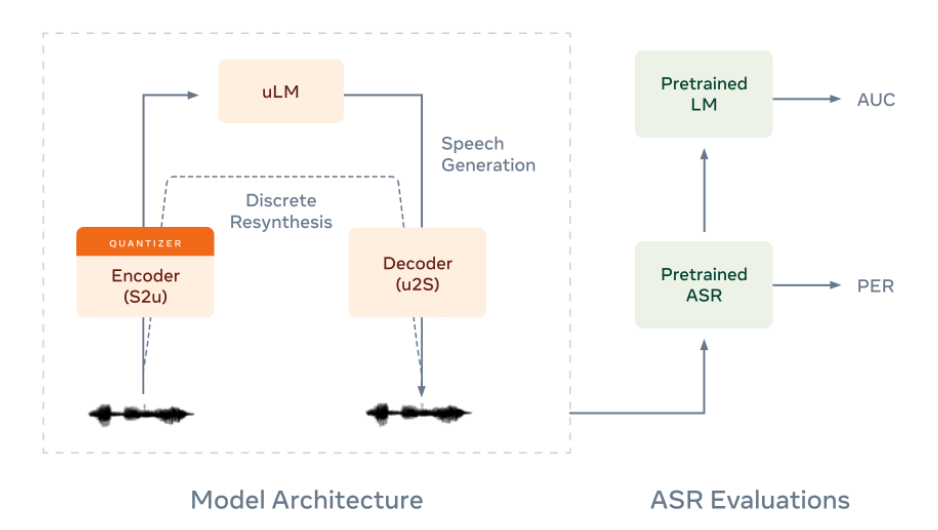
Generative Spoken Language Modeling from Raw Audio In Transactions of the Association for Computational Linguistics
Kushal Lakhotia, Evgeny Kharitonov, Wei-Ning Hsu, Yossi Adi, Adam Polyak, Benjamin Bolte, Tu Anh Nguyen, Jade Copet, Alexei Baevski, Adelrahman Mohamed, Emmanuel Dupoux
Abstract We introduce Generative Spoken Language Modeling, the task of learning the acoustic and linguistic characteristics of a language from raw audio (no text, no labels), and a set of metrics to automatically evaluate the learned representations at acoustic and linguistic levels for both encoding and generation. We set up baseline systems consisting of a discrete speech encoder (returning pseudo-text units), a generative language model (trained on pseudo-text), and a speech decoder (generating a waveform from pseudo-text) all trained without supervision and validate the proposed metrics with human evaluation. Across 3 speech encoders (CPC, wav2vec 2.0, HuBERT), we find that the number of discrete units (50, 100, or 200) matters in a task-dependent and encoder-dependent way, and that some combinations approach text-based systems. Code Blog Demo
Kushal Lakhotia, Evgeny Kharitonov, Wei-Ning Hsu, Yossi Adi, Adam Polyak, Benjamin Bolte, Tu Anh Nguyen, Jade Copet, Alexei Baevski, Adelrahman Mohamed, Emmanuel Dupoux
Abstract We introduce Generative Spoken Language Modeling, the task of learning the acoustic and linguistic characteristics of a language from raw audio (no text, no labels), and a set of metrics to automatically evaluate the learned representations at acoustic and linguistic levels for both encoding and generation. We set up baseline systems consisting of a discrete speech encoder (returning pseudo-text units), a generative language model (trained on pseudo-text), and a speech decoder (generating a waveform from pseudo-text) all trained without supervision and validate the proposed metrics with human evaluation. Across 3 speech encoders (CPC, wav2vec 2.0, HuBERT), we find that the number of discrete units (50, 100, or 200) matters in a task-dependent and encoder-dependent way, and that some combinations approach text-based systems. Code Blog Demo
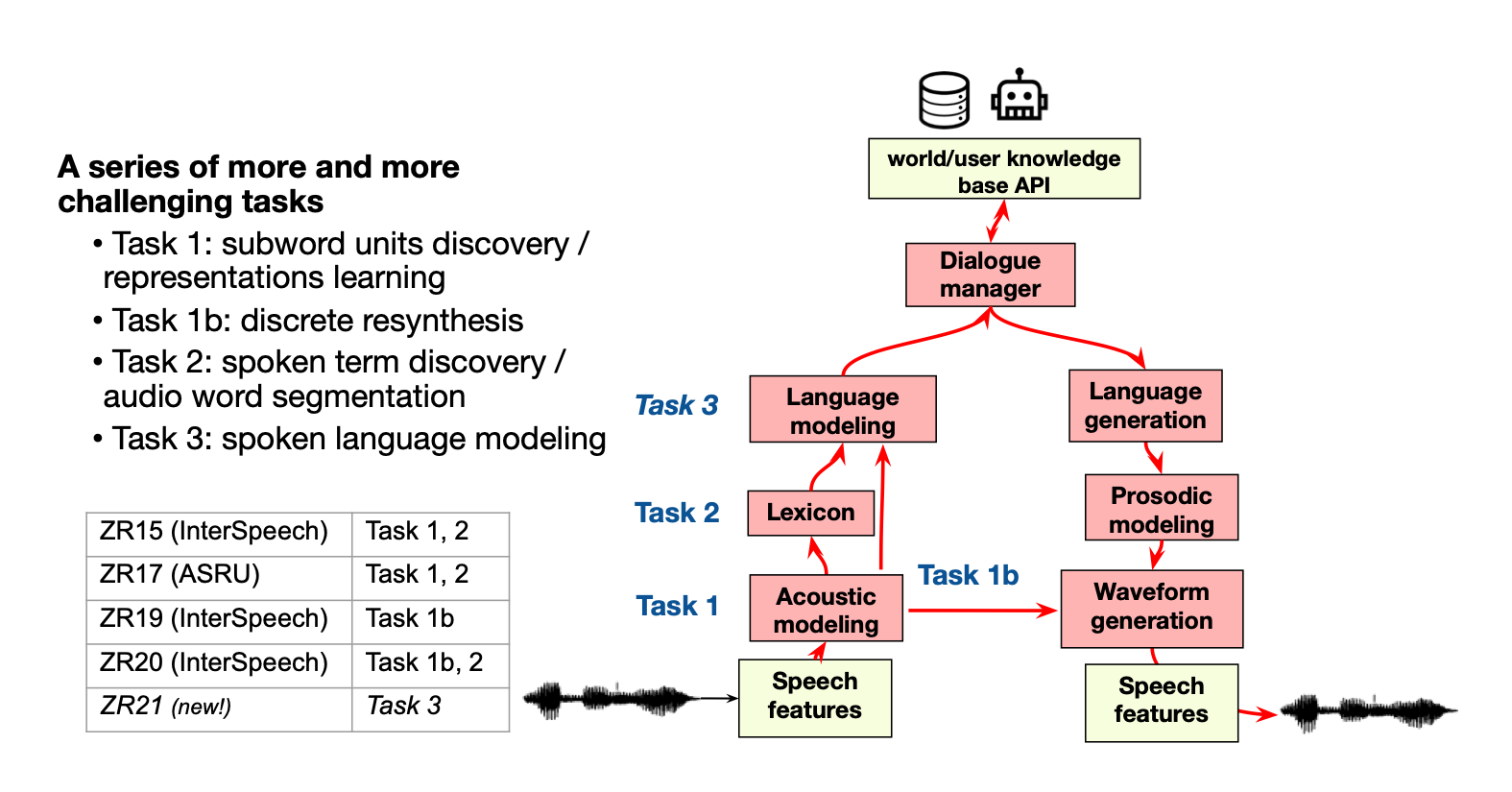
The Zero Resource Speech Challenge 2021: Spoken language modelling In Proc. Interspeech 2021
Ewan Dunbar, Mathieu Bernard, Nicolas Hamilakis, Tu Anh Nguyen, Maureen de Seyssel, Patricia Rozé, Morgane Rivière, Eugene Kharitonov, Emmanuel Dupoux
Abstract We present the Zero Resource Speech Challenge 2021, which asks participants to learn a language model directly from audio, without any text or labels. The challenge is based on the Libri-light dataset, which provides up to 60k hours of audio from English audio books without any associated text. We provide a pipeline baseline system consisting on an encoder based on contrastive predictive coding (CPC), a quantizer (k-means) and a standard language model (BERT or LSTM). The metrics evaluate the learned representations at the acoustic (ABX discrimination), lexical (spot-the-word), syntactic (acceptability judgment) and semantic levels (similarity judgment). We present an overview of the eight submitted systems from four groups and discuss the main results. Code Blog
Ewan Dunbar, Mathieu Bernard, Nicolas Hamilakis, Tu Anh Nguyen, Maureen de Seyssel, Patricia Rozé, Morgane Rivière, Eugene Kharitonov, Emmanuel Dupoux
Abstract We present the Zero Resource Speech Challenge 2021, which asks participants to learn a language model directly from audio, without any text or labels. The challenge is based on the Libri-light dataset, which provides up to 60k hours of audio from English audio books without any associated text. We provide a pipeline baseline system consisting on an encoder based on contrastive predictive coding (CPC), a quantizer (k-means) and a standard language model (BERT or LSTM). The metrics evaluate the learned representations at the acoustic (ABX discrimination), lexical (spot-the-word), syntactic (acceptability judgment) and semantic levels (similarity judgment). We present an overview of the eight submitted systems from four groups and discuss the main results. Code Blog
2020
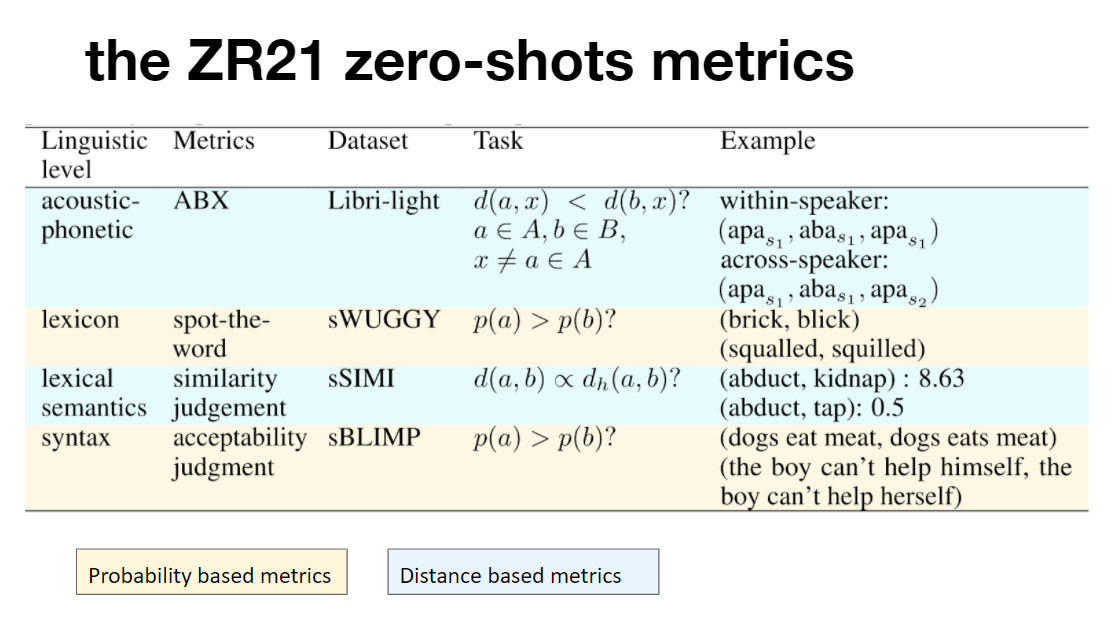
The Zero Resource Speech Benchmark 2021: Metrics and baselines for unsupervised spoken language modeling In NeurIPS 2020 Workshop on Self-Supervised Learning for Speech and Audio Processing
Tu Anh Nguyen*, Maureen de Seyssel*, Patricia Rozé, Morgane Rivière, Evgeny Kharitonov, Alexei Baevski, Ewan Dunbar, Emmanuel Dupoux
Abstract We introduce a new unsupervised task, spoken language modeling: the learning of linguistic representations from raw audio signals without any labels, along with the Zero Resource Speech Benchmark 2021: a suite of 4 black-box, zero-shot metrics probing for the quality of the learned models at 4 linguistic levels: phonetics, lexicon, syntax and semantics. We present the results and analyses of a composite baseline made of the concatenation of three unsupervised systems: self-supervised contrastive representation learning (CPC), clustering (k-means) and language modeling (LSTM or BERT). The language models learn on the basis of the pseudo-text derived from clustering the learned representations. This simple pipeline shows better than chance performance on all four metrics, demonstrating the feasibility of spoken language modeling from raw speech. It also yields worse performance compared to text-based 'topline' systems trained on the same data, delineating the space to be explored by more sophisticated end-to-end models. Code Blog
Tu Anh Nguyen*, Maureen de Seyssel*, Patricia Rozé, Morgane Rivière, Evgeny Kharitonov, Alexei Baevski, Ewan Dunbar, Emmanuel Dupoux
Abstract We introduce a new unsupervised task, spoken language modeling: the learning of linguistic representations from raw audio signals without any labels, along with the Zero Resource Speech Benchmark 2021: a suite of 4 black-box, zero-shot metrics probing for the quality of the learned models at 4 linguistic levels: phonetics, lexicon, syntax and semantics. We present the results and analyses of a composite baseline made of the concatenation of three unsupervised systems: self-supervised contrastive representation learning (CPC), clustering (k-means) and language modeling (LSTM or BERT). The language models learn on the basis of the pseudo-text derived from clustering the learned representations. This simple pipeline shows better than chance performance on all four metrics, demonstrating the feasibility of spoken language modeling from raw speech. It also yields worse performance compared to text-based 'topline' systems trained on the same data, delineating the space to be explored by more sophisticated end-to-end models. Code Blog
2019
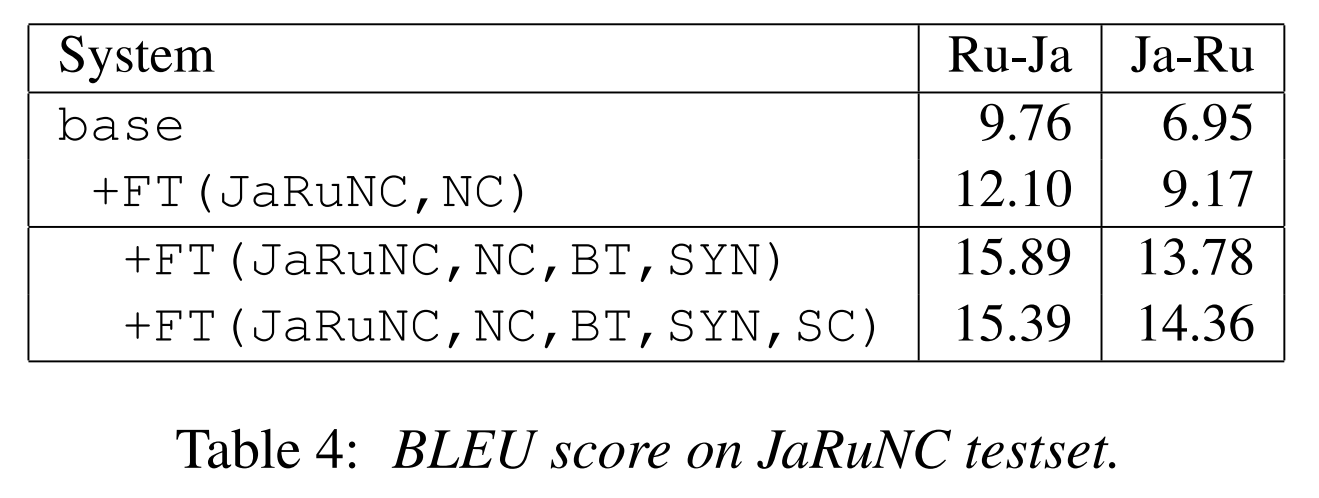
SYSTRAN @ WAT 2019: Russian-Japanese News Commentary task In Proc. of the 6th Workshop on Asian Translation
Jitao Xu, Tu Anh Nguyen, Minh Quang Pham, Josep Crego, Jean Senellart
Abstract This paper describes Systran’s submissions to WAT 2019 Russian-Japanese News Commentary task. A challenging translation task due to the extremely low resources available and the distance of the language pair. We have used the neural Transformer architecture learned over the provided resources and we carried out synthetic data generation experiments which aim at alleviating the data scarcity problem. Results indicate the suitability of the data augmentation experiments, enabling our systems to rank first according to automatic evaluations.
Jitao Xu, Tu Anh Nguyen, Minh Quang Pham, Josep Crego, Jean Senellart
Abstract This paper describes Systran’s submissions to WAT 2019 Russian-Japanese News Commentary task. A challenging translation task due to the extremely low resources available and the distance of the language pair. We have used the neural Transformer architecture learned over the provided resources and we carried out synthetic data generation experiments which aim at alleviating the data scarcity problem. Results indicate the suitability of the data augmentation experiments, enabling our systems to rank first according to automatic evaluations.
* Equal contribution as first authors.
